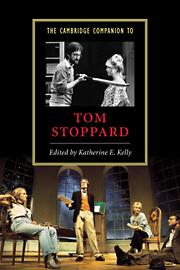14 - The Tom Stoppard Collection at the Harry J. Ransom Humanities Research Center
from PART 3 - CULTURE AND CONTEXT
Published online by Cambridge University Press: 28 May 2006
Summary
The archive of the Tom Stoppard papers at the Harry J. Ransom Humanities Research Center, University of Austin, Texas, has become the primary location for scholarly holdings relating to the playwright and his work. With an array of written and visual materials representing the writer’s work over a broad span of his creative life, this archive is both extensive in range and well contextualized, featuring holdings on related figures such as Stoppard’s contemporary David Hare, the absurdists James Saunders and N. F. Simpson, and others. The Ransom Center holdings document the creative process and reveal the responses of artists to forms and innovations that have gone before. For example, the Ransom Center’s Beckett papers, as well as the archive of the producer Sir Donald Albery, reveal much relating to the ground-breaking development of Waiting for Godot, just as the John Osborne papers, Royal Court papers, and others provide an equally significant context for other artists and historical moments.
A brief examination of the box and folder listings of materials held within the Stoppard papers suggests the variety of inquiry supported by this holding. The listings suggest materials from concept work, through production revisions, through variant treatments for alternate media, as well as the post-production commentary of critics and correspondents. One example that speaks directly to the archive’s capacity to yield evidence of the creative process derives from a meeting summary for work on Squaring the Circle: Poland 1980–1981. The summary records the company’s efforts to create “drama, not documentary.”
- Type
- Chapter
- Information
- The Cambridge Companion to Tom Stoppard , pp. 229 - 230Publisher: Cambridge University PressPrint publication year: 2001



